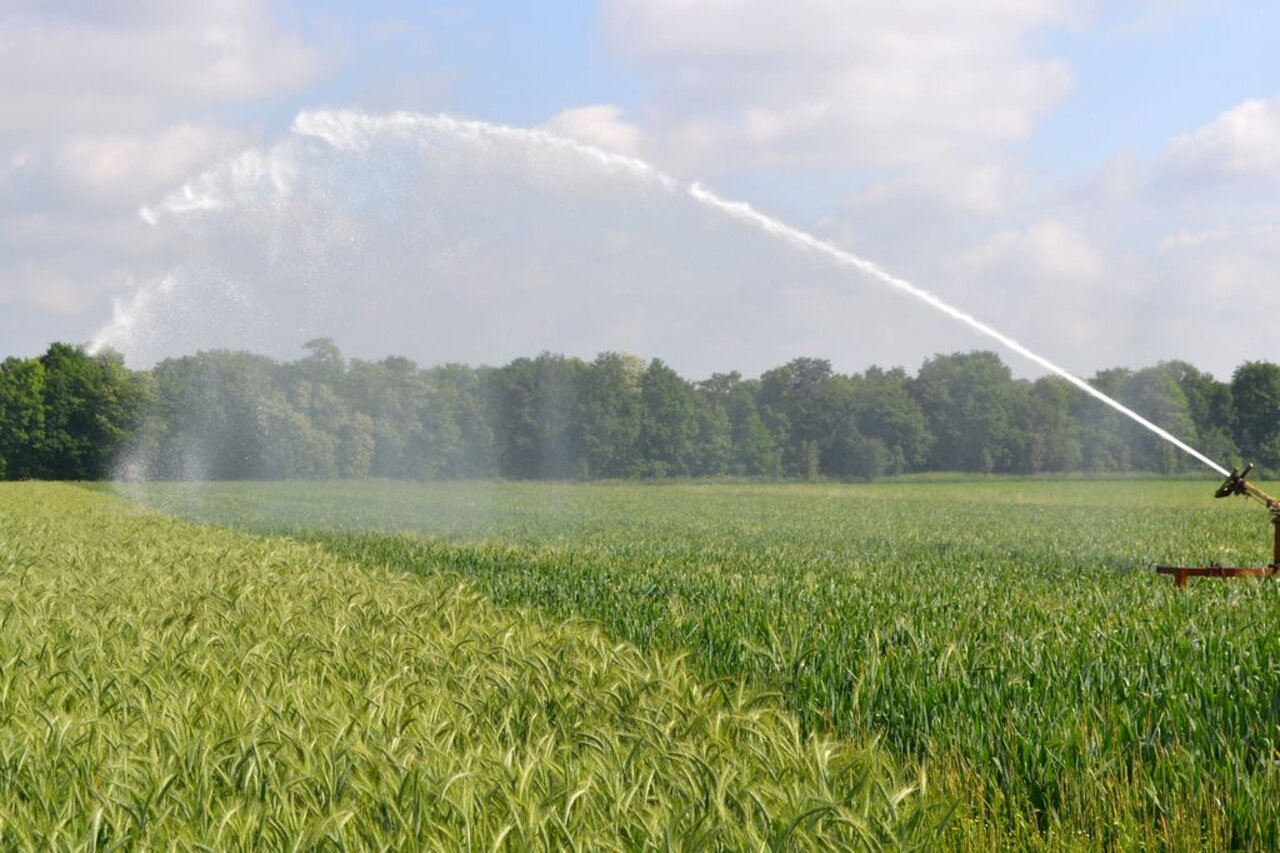Project
Agricultural water management in Germany

LAWAMAD – Agricultural Water Management in Germany
The issues of water availability and water management gain in societal, economic and political importance in the context of advancing climate change. Rising summer temperatures, increasing frequency and intensity of droughts have also negative effects on agricultural sector. How and under consideration of which aspects can water availability for crop production be augmented?
Background and Objective
Agricultural production in Germany uses up to 3 % of total water abstractions, depending on weather conditions in a particular year. The summer droughts in recent years drew attention to the issues of water availability and water management. Increasing evaporation due to higher summer temperatures, regional and seasonal change in precipitation patterns as well as increasing frequency and intensity of extreme weather events will further underpin their importance in the years to come. Thünen Institute – Federal Research Institute in the auspices of the Federal Ministry of Agriculture, Food and Regional Identity – addresses not only the issues of water quality and water pollution control, but also agricultural water demand and water use, and contributes to the development of German-wide water management strategies.
Target Group
policy makers, agricultural producers, advisors, regional water associations, chambers of agriculture, interested professional and general public
Approach
Different aspects of agricultural water demand and small-scale water storage for irrigation are analysed in three sub-projects:
- Subproject A: planning of various water storage options and assessment of resources and materials required for their construction.
- Subproject B: socio-economic and institutional analysis of water storage options and their implementation.
- Subproject C: regionalized description of irrigation and analysis of climate change-induced variations in irrigation demand. Detailed information on this subproject is available here: https://www.thuenen.de/de/institutsuebergreifende-projekte/lawamad-landwirtschaftliches-wassermanagement-deutschland-teilprojekt-c
Data and Methods
Water storage reservoirs can be filled with surface water during increasingly precipitation-rich winter months and used for crop irrigation in summer. In this way, seasonal and eventually interannual differences in water availability can be balanced and the irrigation security for agricultural producers improved.
Within the project three water storage options were considered: (i) storage of surface run-off (local concept), (ii) storage of water abstractions from small watercourses (regional concept) and (iii) storage of water abstractions from large watercourses (supra-regional concept). Hydrological, technical and economic aspects of these three concepts were explored for the agricultural case study in Magdeburg Börde and for the case study in South Pfalz, which is characterized by prevailing horticultural production.
The methodical procedure consists of the following five steps:
- Modelling site specific and crop specific irrigation demand based on climatic water balance
- Modelling outflow in watercourses (for the regional and supra-regional water storage concepts) or surface run-off (for the local water storage concept)
- Comparison of potentially storable water quantities with current and future water demand
- Determining water storage needs and dimensioning water storage reservoirs depending on the level of irrigation security
- Determining capital investment needs for construction of a water storage reservoir. In cooperation with an engineering firm, 22 variants of reservoirs for the three water storage concepts (local, regional and supra-regional) were planned. When dimensioning the reservoirs, different aspects of their design (volume, form, sealing options and ratio between surface area and depth) were tested.
Preliminary Results
The Results gained within the subproject A demonstrate, that the potential of storing surface water is very site-specific. Particularly in the case of the local water storage concept the surface run-off and the potentially storable water quantities depend strongly on the landscape and soil characteristics. Only significantly smaller water amounts for storage can be generated here comparing with water abstractions from small and large watercourses. Furthermore, the implementation of the local water storage option can lead to the conflict of interest between water storage for irrigation and soil protection from erosion.
The hydrological analyses of the regional and supra-regional water storage concepts have shown, that in the case-study regions the outflow in the examined watercourses in winter are sufficient to generate water quantities necessary for irrigation and to forego groundwater abstractions in summer. The potentially abstractable and storable water quantities depend on the conditions for abstractions from watercourses, namely the exact period of time for abstractions and the outflow levels. Regarding the latter, the average low tide flows have been considered. Further research is needed on alternative parameters – e. g. ecologically justified minimal flow – for ensuring sustainability of water abstractions for storage and issuing water abstraction permissions.
The capital investment needs for constructing water storage reservoirs comprise 20-70 € per 1 m3 of stored water, depending on the total volume, sealing materials and the form of a reservoir. These capital needs include construction works, materials, technical facilities and ancillary construction expenses.
To conclude, water storage reservoirs have the potential for increasing water availability for crop irrigation and attenuating the conflicts of interest about limited water resources. This adaptation measure has been increasingly implemented in Germany and may further gain in importance in the nearest future. The economic efficiency of water storage can be improved through the implementation of further adaptation measures such as multifunctional usage of water storage reservoirs or innovative support measures which consider possible societal services of reservoirs beyond water storage. The feasibility of water storage reservoirs requires further development of the legal framework regulating water abstractions from watercourses and the related parameters, as well as further development of public funding framework to improve the economic efficiency of water storage reservoirs.
Thünen-Contact

Involved Thünen-Partners
Involved external Thünen-Partners
-
Technische Universität Braunschweig
(Braunschweig, Deutschland)
- Kai Schröter, Technische Universität Braunschweig
- Hannes Müller-Thomy, Technische Universität Braunschweig
Publications to the project
- 0
Stupak N, Ebers N, von Zepelin R, Ilgen K, Schröter K, Müller-Thomy H (2026) Wasserspeicherbecken als Klimaanpassungsoption für Pflanzenbau in Deutschland: Planung, Umsetzbarkeit, Investitionsbedarf. Braunschweig: Johann Heinrich von Thünen-Institut, 71 p, Thünen Working Paper 278, DOI:10.3220/253-2025-222
- 1
Bernhardt JJ, Stupak N, Neuenfeldt S, Potts F (2025) Status quo der Bewässerung in Deutschland. Braunschweig: Johann Heinrich von Thünen-Institut, 113 p, Thünen Working Paper 258, DOI:10.3220/WP1736495260000
- 2
Stupak N, Ebers N (2025) Wasserspeicher als Option zur Erhöhung der Wasserverfügbarkeit für Bewässerung. Thünen Working Paper 269:9-10, DOI:10.3220/253-2025-45
- 3
Ebers N, Schröter K, Müller-Thomy H (2024) Estimation of future rainfall extreme values by temperature-dependent disaggregation of climate model data. Nat Haz Earth Syst Sci 24(6):2025-2043, DOI:10.5194/nhess-24-2025-2024
- 4
Stupak N, Ebers N (2024) Für trockene Zeiten. Bauernzeit 65(19):36-38
- 5
Stupak N, Ebers N (2024) Für Trockene Zeiten : Wasserverfügbarkeit aus Speicherbecken. Bauernbl Schleswig-Holstein Hamburg 78(24; SH "Bauen auf dem Land"):20-23
- 6
Stupak N, Müller-Thomy H (2024) Landwirtschaftlicher Bewässerungsbedarf und das Potenzial des Oberflächenwassers zur Erhöhung der Wasserverfügbarkeit. Veranstaltungen BfG 1/2024: 18, DOI:10.5675/BfG_Veranst_2024.1
- 7
Stupak N (2024) Zukunft des landwirtschaftlichen Wassermanagements. B&B Agrar 77(2):8-9
- 8
Ebers N, Stupak N, Hüttel S, Woelfert M, Müller-Thomy H (2023) Potenzialabschätzung von technischen Wasserspeicheroptionen, Bewässerungsansätzen und ihrer Umsetzbarkeit. Braunschweig: Johann Heinrich von Thünen-Institut, 58 p, Thünen Working Paper 227, DOI:10.3220/WP1700732748000
- 9
Stupak N (2023) Wasser speichern [Interview]. Top Agrar 52(8):25






